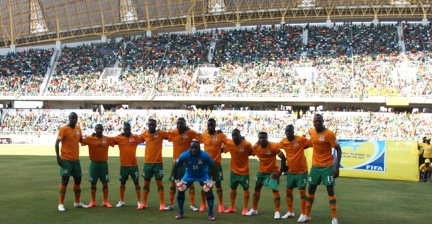
Guest Post by *Hikabwa Chipande
NDOLA — Zambia’s victory in the 2012 African Nations Cup has spawned a new fashion on the Copperbelt — the country’s industrial and football heartland — where people now wear Chipolopolo (Copper-bullets) replica jerseys as well as chitenge (women’s waist wraps) in the national colors. Selling Chipolopolo regalia has also become big business in street markets and makeshift stores. Clearly, the African champions have re-energized the mood of the nation and revitalized support for football among ordinary citizens, politicians, and business people.
The stability of copper prices, increases in copper production, an improving economy, and the pride of being African football champions, have led ZCCM Investments Holdings, formerly Zambian Consolidated Copper Mines, to reconsider supporting the sport. For instance, private companies such as Mopani Copper Mines and Copperbelt Energy have resumed their funding of Kitwe’s famous Nkana Red Devils and Power Dynamos.
“Winning the African Cup changed things,” says Red Devils head coach Linos Makwaza. “People have started coming back to football. At Nkana [Football Club] Mopani [Copper Mines] is now involved and has taken over which is good,” Makwaza says. The relationship between mining companies and football is not a new one. It has shaped the history of the game in Zambia. As far back as the 1920s, when copper mining started on the Copperbelt under British colonial rule, and into the independence era up to the privatization of the ZCCM mining company in 1991, government-controlled mining companies provided football grounds, financial resources, coaches, players, and stimulated a deeply rooted fan culture.
Zambia’s Nations Cup success has inspired politicians such as Sports Minister Chishimba Kambwili to encourage new owners of copper mining companies to sponsor Mighty Mufulira Wanderers, Nchanga Rangers, Nkonkola Blades, Roan United, Kalulushi Modern Stars and other important, but struggling, clubs in the mining province. Abraham Nkole, currently Mighty Mufulira Wanderers manager and a former player in the 1960s and 1970s, sees this shift as an opportunity to resuscitate the “lost glories” of Copperbelt football.
The opening of a modern stadium in the mining town of Ndola has also injected new life in Copperbelt football. I was in attendance on June 9, 2012, for the inauguration of the Chinese-built 40,000 capacity Levy Mwanawasa Stadium, which hosted a Zambia vs. Ghana 2014 World Cup group D qualifying match (see photo). Thousands of fans clad in green and orange Chipolopolo replica jerseys besieged Ndola. With Vice President Dr. Guy Scott in the stands, Chipolopolo beat the Black Stars 1-0 in the packed stadium, thus renewing their hopes for qualifying to Brazil 2014 after being thumped by Sudan 2-0 in Khartoum a week earlier.
Practitioners and fans I spoke to on the Copperbelt are encouraged by recent developments and hope the mining province will soon reclaim its dominant position in Zambian football after two decades of decline. The political and financial investment that is fueling the game’s resuscitation owes much to Chipolopolo’s international success. The question is whether such support will continue should the national team perform badly at next year’s African Nations Cup in South Africa.
*Hikabwa Chipande is a PhD candidate in African history at Michigan State University. His dissertation research is on the social and cultural history of football in 20th-century Zambia. He can be contacted at chipande [at] msu [dot] edu.
Tag: African Nations Cup
Chipolopolo Champions of Africa
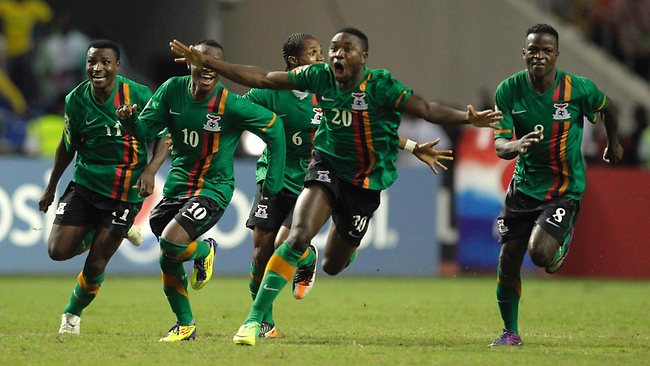
The room was tense. Zambia and Ivory Coast had played their hearts out in a goalless draw over 120+ minutes and now it came down to penalties. With me, watching a good stream on the big screen at work (on a Sunday), were three Zambians, a Kenyan, two American soccer aficionados, and my family.
Drogba had missed a penalty in regulation so the momentum seemed ever so slightly to favor the underdog Zambians. Chipolopolo prayed and prayed on the pitch, one of our Zambian friends commented wryly: “I didn’t know Zambians were so religious!”
As Zambia’s French coach Herve Renard would tell the media after the game, “I know we’re not the best, but we have a strength and force that animated our team.”
With the score tied at 7-7 in the shootout, Arsenal’s Gervinho shot wide and Sunzu stepped up for Zambia’s second chance to win.
Gooooooool!!!! The Zambians roared.
“I can’t believe it happened in my lifetime,” one of the Chipolopolo supporters exclaimed. We saluted the champions of Africa. Cell phones came out in an attempt to reach Lusaka.
The day after, not many people are at work, or so it seems . . . the Lusaka Times reports that “a thunderous welcome awaits the newly crowned Champions of African football” at Kaunda airport today.
With eight of the Zambian players based in South Africa, a national anthem based on Nkosi Sikelel’, and venerable liberation struggle ties, some of us delight in the fiction that a little piece of South Africa won as well.
That Chipolopolo became champions of Africa in Libreville, where the 1993 air crash killed the greatest Zambian team ever, made this triumph all the more special.
Viva Chipolopolo Viva!
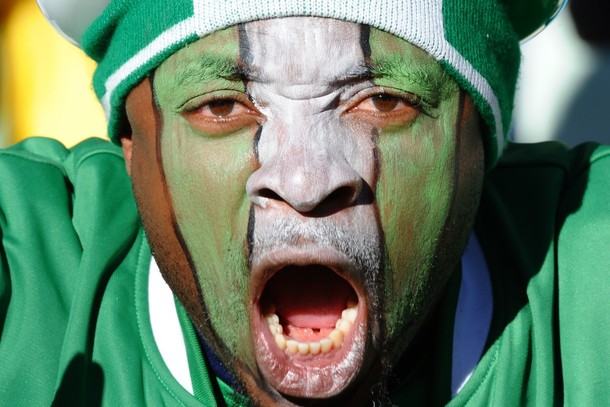
The Times (London), January 25, 2012
By Matthew Syed
It is no coincidence that Alex Salmond, the wily and rather combative leader of the SNP, is fighting to hold the referendum on Scottish independence in 2014. This, of course, is partly to do with the anniversary of the Battle of Bannock-burn, where the Scots gave the English a bit of a kicking in the First War of Scottish Independence.
But, perhaps even more significantly, it is also about the Commonwealth Games in Glasgow and a recognition that the patriotism that invariably surrounds great sporting occasions could lend the campaign for secession unstoppable momentum. No wonder David Cameron wants to hold the referendum early.
Few politicians, let alone sports fans, have failed to recognise the curious alchemy of events such as the Commonwealth Games, not to mention the Olympics and World Cup. It is not just the anthem-singing and the flag-waving, but a sense of unity that is conspicuous by its absence at just about any other time in national life – with the possible exception of a royal wedding.
We are divided by religion, by political affiliation, by cultural allegiance and by our attitudes to Simon Cowell but, when David Beckham is charging around against Greece, or Sally Gunnell is leaping around Montjuic, or Tim Henman is getting edgy against Pete Sampras in SW19, we are bound up in a shared national story. Look hard and you can almost see the pages moving.
In this sense the Africa Cup of Nations, which started at the weekend, is perhaps the most important sporting event in the world. Not in terms of the football, of course – although the European club stars who return home to represent their homelands lend stardust to an event that improves in quality with each incarnation – but rather in terms of the politics of identity. As the players of Niger and Libya and Equatorial Guinea cruise around the pitch, you can see history in the making.
Interview with Yaya Touré
With the African Nations Cup about to kick off this weekend in Equatorial Guinea and Gabon, it’s time to put the spotlight on Yaya Touré, the Ivorian international and Man City midfielder. In this part of a longer interview produced by his new endorser — Puma, an expanding commercial force in African football — the best-paid player in the English Premier League reflects on growing up in Ivory Coast, learning the game in Bouake, and then moving to big-time football in Abidjan.
Thanks to Tom McCabe for telling me about this interview.
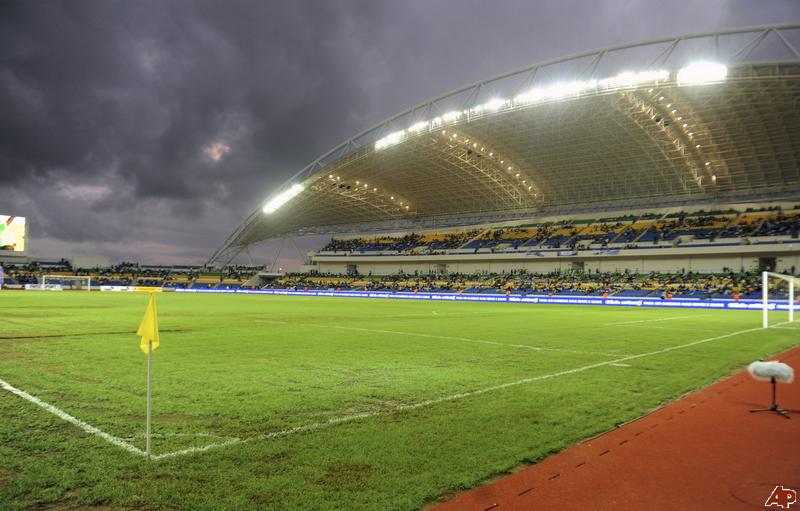
Guest Post by Andrew Guest (drewguest AT hotmail DOT com)
It’s that time again; the biennial opportunity for Africa’s best national teams to compete for the continental championship, and European club management to complain about the audacity of former colonies holding a tournament smack in the middle of the league season — extracting labor in a reverse flow that might promote some useful self-reflection, if not for the blinders fused on most of the professional football world.
It always good fun to watch the machinations, even from a distance — the actual football starts January 21 in Bata, Equatorial Guinea, and ends with the final on February 12 in Libreville, the capital of co-host Gabon. As in 2010 in Angola, most of us will be watching from a distance: the oil-rich states that CAF has recently favored in its hosting decisions are note easy places to get to.
The Zebras Make History
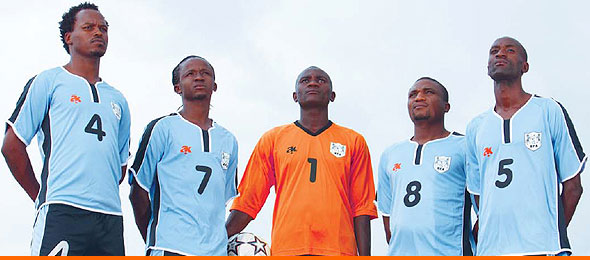
By Hikabwa Decius Chipande in Gaborone, Botswana
Saturday, March 26, 2011, was a day of jubilation in Gaborone, the capital city of Botswana. The Zebras — Botswana’s national football team –- made history by qualifying for next year’s African Nations Cup in Gabon and Equatorial Guinea. The Zebras boasted an unbeaten record after defeating Tunisia and Togo — teams with World Cup finals experience — and needed three points in N’Djamena against hosts Chad to qualify for the first time for the prestigious biennial tournament. Botswana accomplished this task, amazingly, with two games to spare after beating Chad 1-0 and topping their qualification group with 16 points.
The day of the match between Botswana and Chad was full of excitement in Gaborone. A lot of people wore national football team regalia, while national colors adorned public transport buses and private cars. The mood in the city was electric and expectant such that one would think that the match was being played at the National Stadium in Gaborone.
When the match started, people watched it indoors on Botswana Television while motorists listened to radio commentary in their vehicles. Hundreds of people watched the match live on huge television screens erected in Fair Grounds in the middle of the city, courtesy of Orange — the mobile phone service provider and official sponsor of the national team. When the match started the city was quiet; one could only hear radio and television commentary echoing through the air.
Then in the 54th minute fans exploded in celebration when Botswana’s Jerome Ramatlhakwana scored. After the final whistle, there was euphoria in Gabs. A lot of people came out of their homes jumping and singing, while motorists were honking in all directions. The Botswana Football Association President, Mr. David Fan, pointed out that this qualification was long overdue and it means a lot for football in Botswana. “The people of Botswana have long been waiting for this moment. The fact that we have achieved this feat is a huge cause for celebrations,” said Mr. Fani.
For a country of about 1.8 million people, the historic win in Chad is no random occurrence. After the game, an overjoyed Stan Tshosane, the national team coach, thanked the team for their relentless effort and meticulous preparations. “It’s a culmination of hard work,” said Tshosane; “We knew what we were doing from the onset.”
The Minister of Youth, Sport and Culture, Mr. Shaw Kgathi, gave a statement in Parliament assuring the Zebras and the country’s football fans that the government of Botswana would continue funding and supporting the preparations for the 2012 African Nations Cup. The victorious Zebras will be given an official welcome reception by the President, Lt. Gen. Seretse Khama Ian Khama, on April 8 in Gaborone.
Confusão continua…
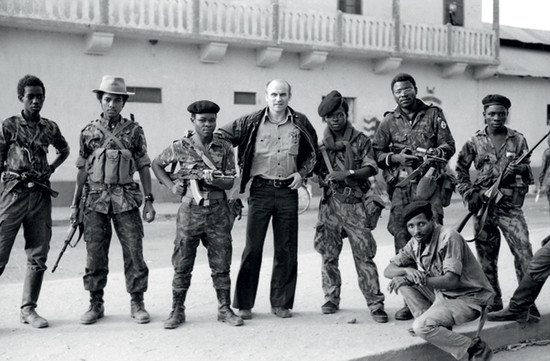
CAF have announced Togo will be disqualified if they do not materialize for the kick off of their fixture against Ghana tonight in Cabinda.
Rumours abound whether Botswana, The Republic of the Congo or Namibia will be invited to do a “Denmark”.
Cabinda’s separatist rebels, FLEC, have apologized for the attack, claiming it was a mistake to attack the Togolese, and have presented their condolences to the families of the deceased.
Pessimists supported by hustlers and vultures from the security and shock industry continue to make fear representations to the press about South Africa’s World Cup.
And it now seems Confusão has rubbed off on the Algerian defence, who are being torn to shreds by Malawi.